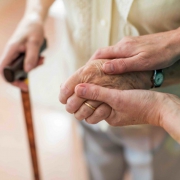Combat Sleep Problems as You Age
We often hear from older friends and family – or perhaps from yourself – “I had a terrible sleep last night.” Sleep patterns tend to change, and that is perfectly normal as we grow older. Research shows that older adults may require less sleep than in younger years as they typically experience decreased physical activity.
However, not all changes in sleep patterns are normal. Some sleep problems manifest due to underlying and sometimes undiagnosed medical problems. Arthritis and osteoporosis, digestive issues, incontinence, medication side effects, COPD, even a long-term effect of COVID-19 can affect sleeping quality. It is important to address and manage these conditions to improve sleep because lack of proper rest may lead to irritability, depressions, high blood pressure, memory loss, and decreased alertness that can lead to unintentional falls or car accidents.
Understanding Aging and Sleep Issues
If you experience insomnia often and feel sleepy during the day, take stock of your lifestyle. Get more physical exercise, improve your sleep environment, put away digital devices and television earlier, and avoid caffeine and alcohol contributing to better sleep patterns. If you experience significant anxiety, consult your doctor as medication may be necessary. The blog Right at Home has suggestions for promoting better sleep at 10 Tips for Improving Sleep Quality.
Sleep apnea, snoring, and other forms of sleep-related breathing disorders (SRBD) are a spectrum of breathing problems while asleep. Sleep apnea is common, usually appearing in middle age, and is associated with other health-related issues. The frequent pausing of breath, most commonly obstructive sleep apnea, is associated with snoring. Experiencing SRBD is associated with poor health problems and outcomes such as coronary artery disease, heart failure, stroke, and an increase in mortality.
During sleep, it is normal to shift position. However, abnormal movements are known as Sleep-related movement disorder (SRMD) and may significantly disturb your sleep or your partner’s. Restless leg syndrome is the frequent moving of limbs to quell unpleasant sensations in the legs. Clenching the jaw or grinding teeth during sleep is called bruxism and can increase blood pressure. These movement disorders often accompany other sleep-related issues. A leg cramp is not an SRMD. Experiencing sleep-related leg cramping is often idiopathic or can be related to a deficiency in vitamins or minerals.
A pattern of daytime napping becomes more prevalent in older adults but can lead to nighttime sleep disruption. However, if a day is unusually active, a nap may be appropriate and beneficial. Many cultures consider napping a routine daily activity; however, these cultures typically keep different hours than most Americans. Daytime napping can occur because of a partner’s restless, unhealthy sleeping patterns disrupting their sleep. Using earplugs or moving into a different room are ways to address second-hand sleep problems.
If you provide care for a spouse or older relative with dementia problems, you may notice sundown syndrome. A person with dementia may exhibit restlessness, agitation and be hyper awake in the late afternoon and early evening. The individual may resist going to bed and refuse to stay in bed, getting up repeatedly throughout the night, increasing the chance of injury and exhausting their caregiver. Sundown syndrome may indicate that it is time to move the individual with dementia to a full-time monitored care facility.
Sleep disorders due to Alzheimer’s disease and other dementias can pose special considerations as brain deterioration affects how the brain sleeps. Less time in deep sleep and more awake time during the night causes issues with the circadian rhythm. And while lack of sleep can worsen thinking and behavior in everyone, for those with dementia, these consequences are all the more serious with an increase in irrational and emotional instability, which already presents a problem.
The Importance of Being Proactive about Sleep Issues
Make healthy sleep a priority by keeping a routine that trains your brain to release sleep hormones called melatonin at the right time. Commit to a bed and wake-up time every day and ensure your sleep environment is a restful one. Relaxing activities such as reading, listening to calm music, a warm bath, or meditation can help the body unwind from the day’s activities and promote good sleep. Be sure to power down all digital devices like tablets, computers, phones, even TVs which can suppress melatonin early in the evening hours. Sleep problems in later years may change but should not significantly affect your rest and may indicate an underlying medical condition.
Sleep specialists can evaluate, diagnose and offer courses of treatment for a wide variety of sleep problems. Managing medical conditions and employing good sleep guidelines can bring you healthy, restful sleep. Control the things that you can, assess your sleep quality, and make adjustments to improve your sleep experience. You will feel better, think more clearly, and make better decisions with proper rest.
We hope you enjoyed this article. Please contact our Ruston, LA office by calling us at (318) 255-1760 or schedule an appointment to discuss how we can help with your planning needs.



